Impact of Global Business Environment on Social Media and Economies
VerifiedAdded on 2020/10/05
|7
|2102
|223
Report
AI Summary
This report provides a comprehensive analysis of the global business environment, focusing on the risks faced by social media firms due to regulatory changes and data security concerns. It examines the impact of President Trump's economic policies on foreign economies, particularly regarding trade protectionism and its effects on countries like China and the UK. Furthermore, the report identifies opportunities for emerging economies to expand globally, emphasizing the importance of market understanding, local adaptation, and the use of financial models to navigate economic volatility. The report highlights the significance of emerging markets in global economics and their potential for growth, profitability, and improved economic status. The report also references several academic sources and online resources to support its findings.
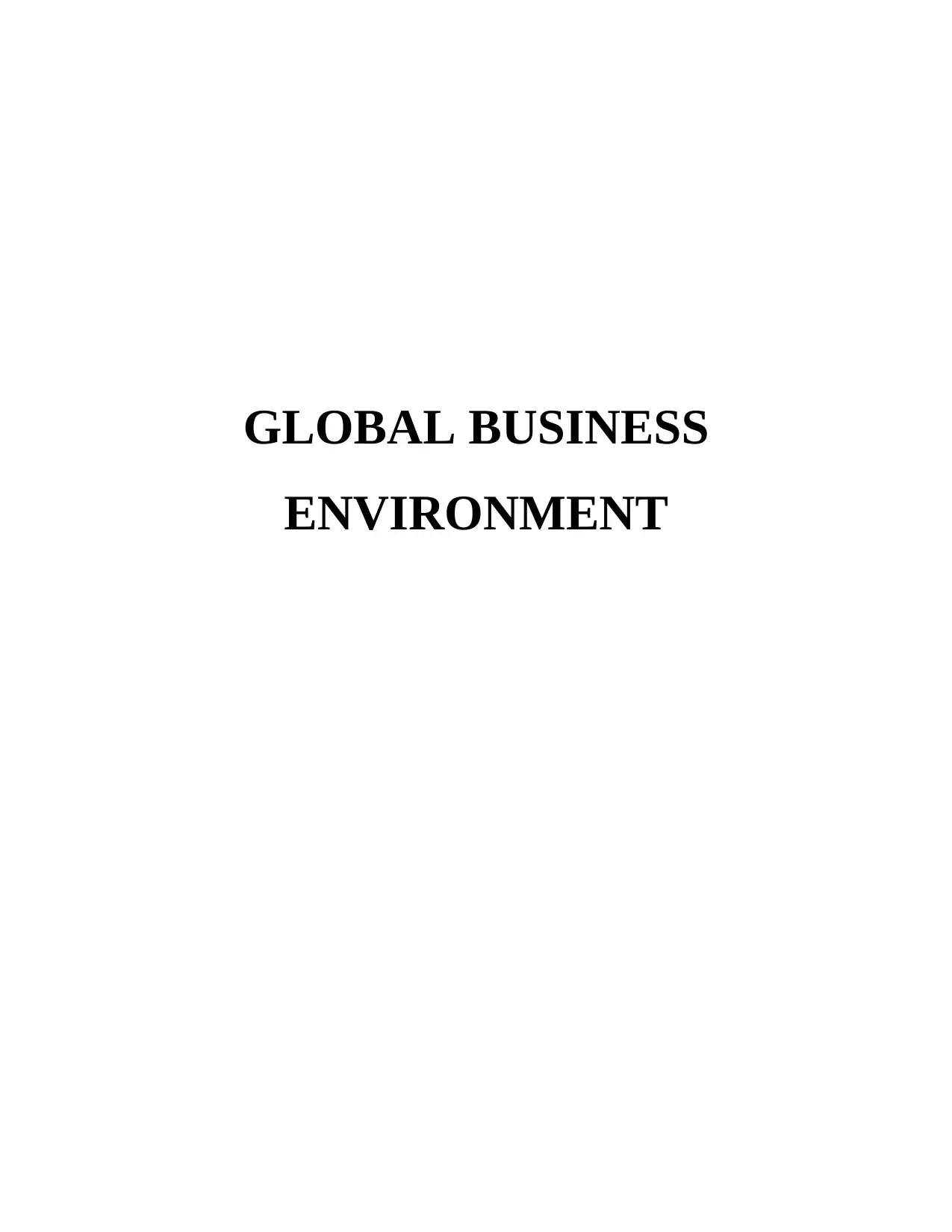
GLOBAL BUSINESS
ENVIRONMENT
ENVIRONMENT
Paraphrase This Document
Need a fresh take? Get an instant paraphrase of this document with our AI Paraphraser
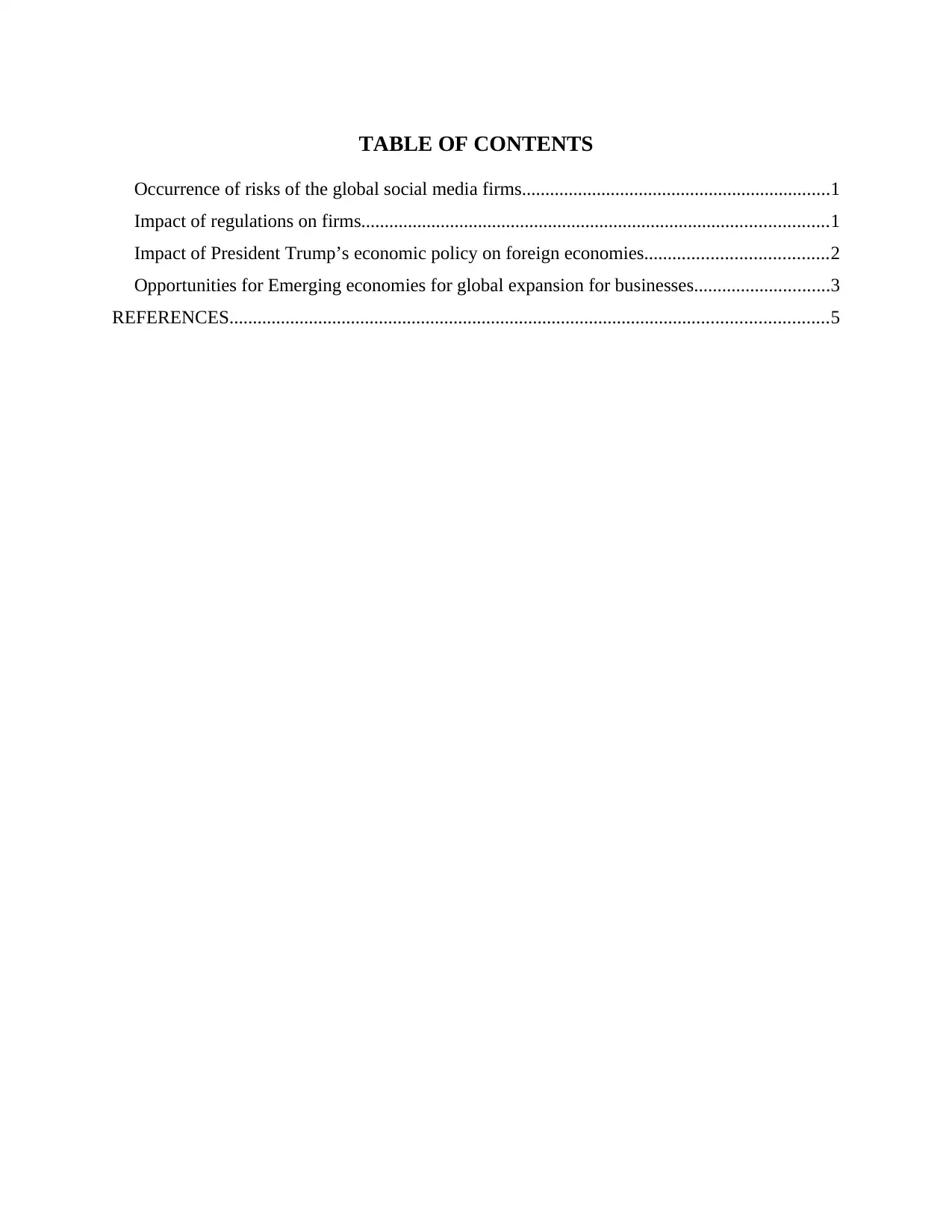
TABLE OF CONTENTS
Occurrence of risks of the global social media firms..................................................................1
Impact of regulations on firms....................................................................................................1
Impact of President Trump’s economic policy on foreign economies.......................................2
Opportunities for Emerging economies for global expansion for businesses.............................3
REFERENCES................................................................................................................................5
Occurrence of risks of the global social media firms..................................................................1
Impact of regulations on firms....................................................................................................1
Impact of President Trump’s economic policy on foreign economies.......................................2
Opportunities for Emerging economies for global expansion for businesses.............................3
REFERENCES................................................................................................................................5
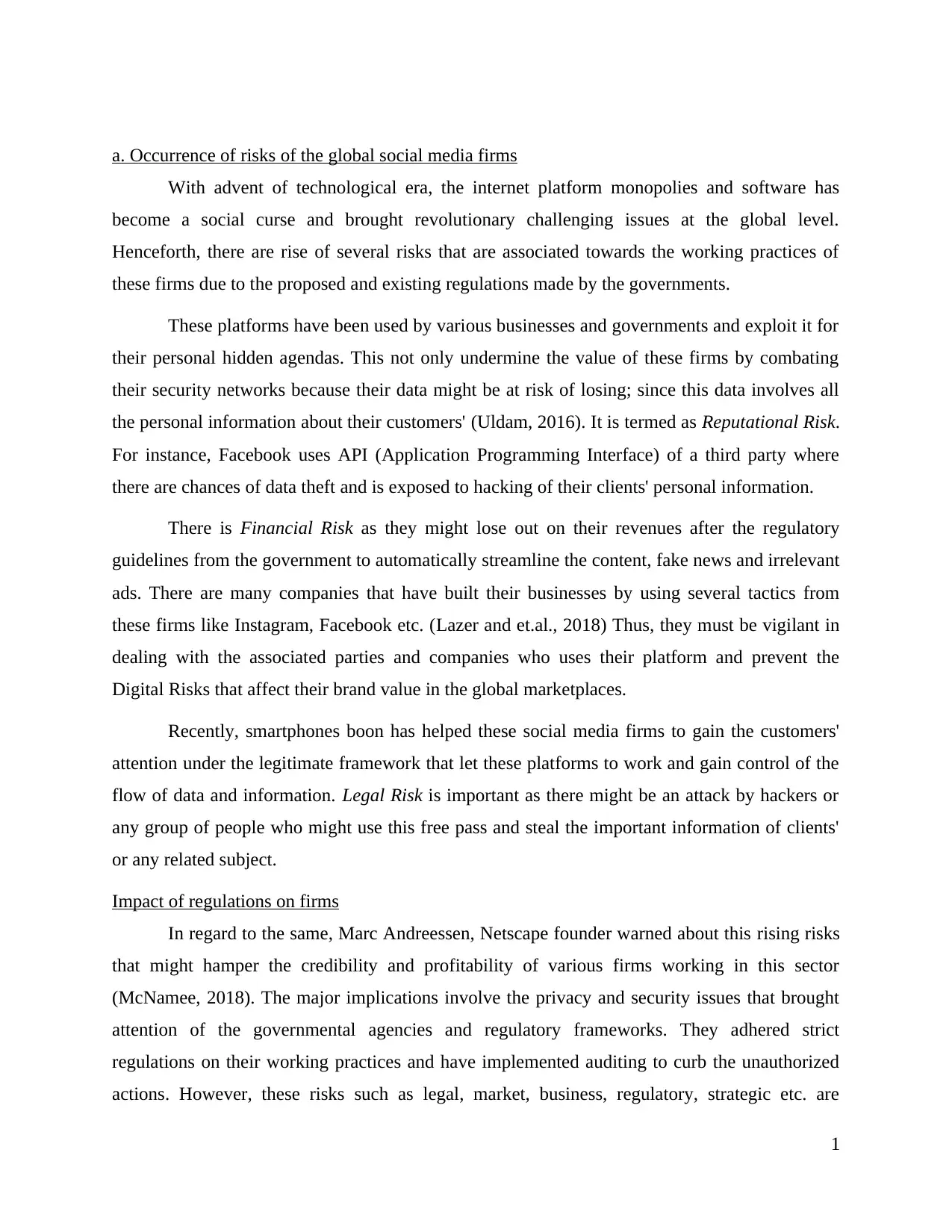
a. Occurrence of risks of the global social media firms
With advent of technological era, the internet platform monopolies and software has
become a social curse and brought revolutionary challenging issues at the global level.
Henceforth, there are rise of several risks that are associated towards the working practices of
these firms due to the proposed and existing regulations made by the governments.
These platforms have been used by various businesses and governments and exploit it for
their personal hidden agendas. This not only undermine the value of these firms by combating
their security networks because their data might be at risk of losing; since this data involves all
the personal information about their customers' (Uldam, 2016). It is termed as Reputational Risk.
For instance, Facebook uses API (Application Programming Interface) of a third party where
there are chances of data theft and is exposed to hacking of their clients' personal information.
There is Financial Risk as they might lose out on their revenues after the regulatory
guidelines from the government to automatically streamline the content, fake news and irrelevant
ads. There are many companies that have built their businesses by using several tactics from
these firms like Instagram, Facebook etc. (Lazer and et.al., 2018) Thus, they must be vigilant in
dealing with the associated parties and companies who uses their platform and prevent the
Digital Risks that affect their brand value in the global marketplaces.
Recently, smartphones boon has helped these social media firms to gain the customers'
attention under the legitimate framework that let these platforms to work and gain control of the
flow of data and information. Legal Risk is important as there might be an attack by hackers or
any group of people who might use this free pass and steal the important information of clients'
or any related subject.
Impact of regulations on firms
In regard to the same, Marc Andreessen, Netscape founder warned about this rising risks
that might hamper the credibility and profitability of various firms working in this sector
(McNamee, 2018). The major implications involve the privacy and security issues that brought
attention of the governmental agencies and regulatory frameworks. They adhered strict
regulations on their working practices and have implemented auditing to curb the unauthorized
actions. However, these risks such as legal, market, business, regulatory, strategic etc. are
1
With advent of technological era, the internet platform monopolies and software has
become a social curse and brought revolutionary challenging issues at the global level.
Henceforth, there are rise of several risks that are associated towards the working practices of
these firms due to the proposed and existing regulations made by the governments.
These platforms have been used by various businesses and governments and exploit it for
their personal hidden agendas. This not only undermine the value of these firms by combating
their security networks because their data might be at risk of losing; since this data involves all
the personal information about their customers' (Uldam, 2016). It is termed as Reputational Risk.
For instance, Facebook uses API (Application Programming Interface) of a third party where
there are chances of data theft and is exposed to hacking of their clients' personal information.
There is Financial Risk as they might lose out on their revenues after the regulatory
guidelines from the government to automatically streamline the content, fake news and irrelevant
ads. There are many companies that have built their businesses by using several tactics from
these firms like Instagram, Facebook etc. (Lazer and et.al., 2018) Thus, they must be vigilant in
dealing with the associated parties and companies who uses their platform and prevent the
Digital Risks that affect their brand value in the global marketplaces.
Recently, smartphones boon has helped these social media firms to gain the customers'
attention under the legitimate framework that let these platforms to work and gain control of the
flow of data and information. Legal Risk is important as there might be an attack by hackers or
any group of people who might use this free pass and steal the important information of clients'
or any related subject.
Impact of regulations on firms
In regard to the same, Marc Andreessen, Netscape founder warned about this rising risks
that might hamper the credibility and profitability of various firms working in this sector
(McNamee, 2018). The major implications involve the privacy and security issues that brought
attention of the governmental agencies and regulatory frameworks. They adhered strict
regulations on their working practices and have implemented auditing to curb the unauthorized
actions. However, these risks such as legal, market, business, regulatory, strategic etc. are
1
⊘ This is a preview!⊘
Do you want full access?
Subscribe today to unlock all pages.

Trusted by 1+ million students worldwide
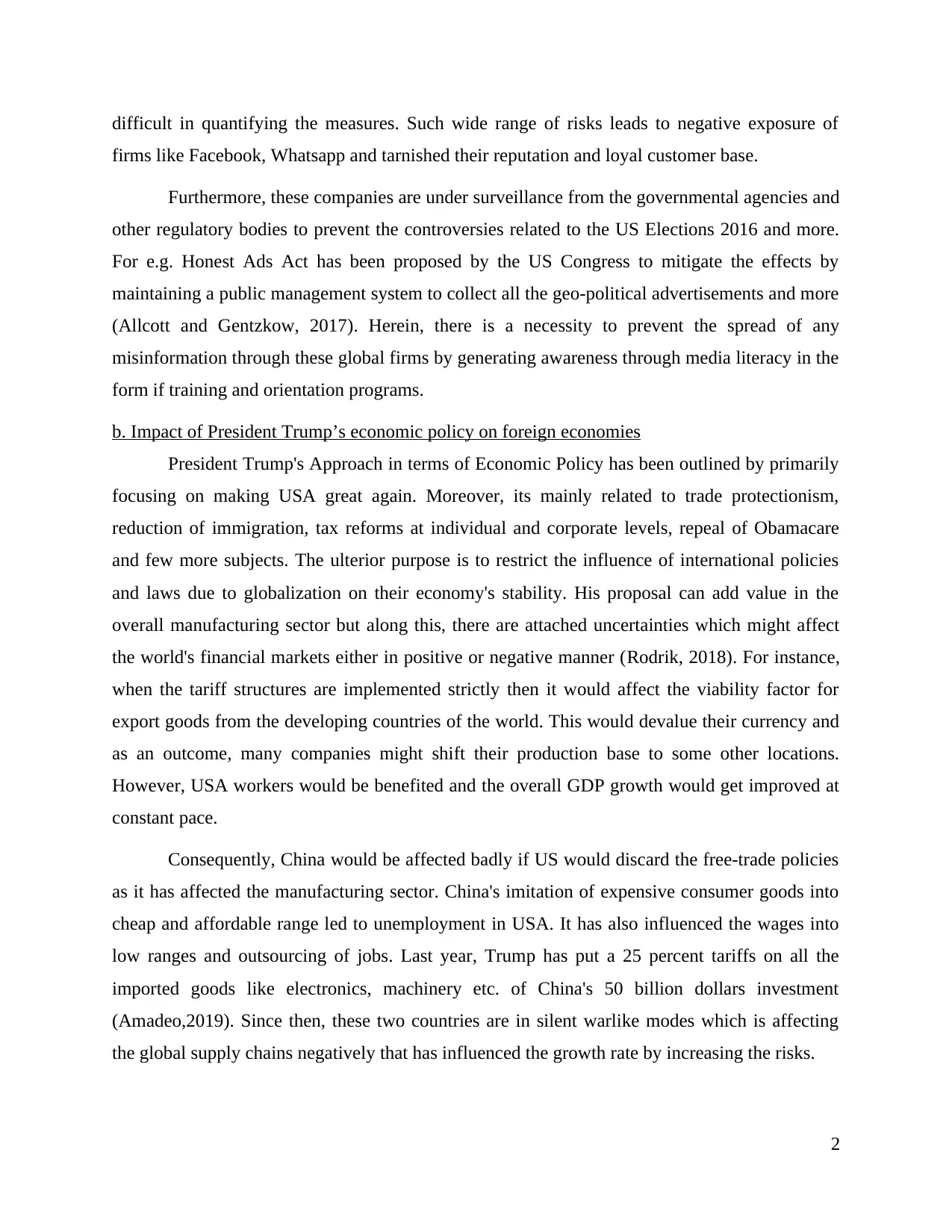
difficult in quantifying the measures. Such wide range of risks leads to negative exposure of
firms like Facebook, Whatsapp and tarnished their reputation and loyal customer base.
Furthermore, these companies are under surveillance from the governmental agencies and
other regulatory bodies to prevent the controversies related to the US Elections 2016 and more.
For e.g. Honest Ads Act has been proposed by the US Congress to mitigate the effects by
maintaining a public management system to collect all the geo-political advertisements and more
(Allcott and Gentzkow, 2017). Herein, there is a necessity to prevent the spread of any
misinformation through these global firms by generating awareness through media literacy in the
form if training and orientation programs.
b. Impact of President Trump’s economic policy on foreign economies
President Trump's Approach in terms of Economic Policy has been outlined by primarily
focusing on making USA great again. Moreover, its mainly related to trade protectionism,
reduction of immigration, tax reforms at individual and corporate levels, repeal of Obamacare
and few more subjects. The ulterior purpose is to restrict the influence of international policies
and laws due to globalization on their economy's stability. His proposal can add value in the
overall manufacturing sector but along this, there are attached uncertainties which might affect
the world's financial markets either in positive or negative manner (Rodrik, 2018). For instance,
when the tariff structures are implemented strictly then it would affect the viability factor for
export goods from the developing countries of the world. This would devalue their currency and
as an outcome, many companies might shift their production base to some other locations.
However, USA workers would be benefited and the overall GDP growth would get improved at
constant pace.
Consequently, China would be affected badly if US would discard the free-trade policies
as it has affected the manufacturing sector. China's imitation of expensive consumer goods into
cheap and affordable range led to unemployment in USA. It has also influenced the wages into
low ranges and outsourcing of jobs. Last year, Trump has put a 25 percent tariffs on all the
imported goods like electronics, machinery etc. of China's 50 billion dollars investment
(Amadeo,2019). Since then, these two countries are in silent warlike modes which is affecting
the global supply chains negatively that has influenced the growth rate by increasing the risks.
2
firms like Facebook, Whatsapp and tarnished their reputation and loyal customer base.
Furthermore, these companies are under surveillance from the governmental agencies and
other regulatory bodies to prevent the controversies related to the US Elections 2016 and more.
For e.g. Honest Ads Act has been proposed by the US Congress to mitigate the effects by
maintaining a public management system to collect all the geo-political advertisements and more
(Allcott and Gentzkow, 2017). Herein, there is a necessity to prevent the spread of any
misinformation through these global firms by generating awareness through media literacy in the
form if training and orientation programs.
b. Impact of President Trump’s economic policy on foreign economies
President Trump's Approach in terms of Economic Policy has been outlined by primarily
focusing on making USA great again. Moreover, its mainly related to trade protectionism,
reduction of immigration, tax reforms at individual and corporate levels, repeal of Obamacare
and few more subjects. The ulterior purpose is to restrict the influence of international policies
and laws due to globalization on their economy's stability. His proposal can add value in the
overall manufacturing sector but along this, there are attached uncertainties which might affect
the world's financial markets either in positive or negative manner (Rodrik, 2018). For instance,
when the tariff structures are implemented strictly then it would affect the viability factor for
export goods from the developing countries of the world. This would devalue their currency and
as an outcome, many companies might shift their production base to some other locations.
However, USA workers would be benefited and the overall GDP growth would get improved at
constant pace.
Consequently, China would be affected badly if US would discard the free-trade policies
as it has affected the manufacturing sector. China's imitation of expensive consumer goods into
cheap and affordable range led to unemployment in USA. It has also influenced the wages into
low ranges and outsourcing of jobs. Last year, Trump has put a 25 percent tariffs on all the
imported goods like electronics, machinery etc. of China's 50 billion dollars investment
(Amadeo,2019). Since then, these two countries are in silent warlike modes which is affecting
the global supply chains negatively that has influenced the growth rate by increasing the risks.
2
Paraphrase This Document
Need a fresh take? Get an instant paraphrase of this document with our AI Paraphraser
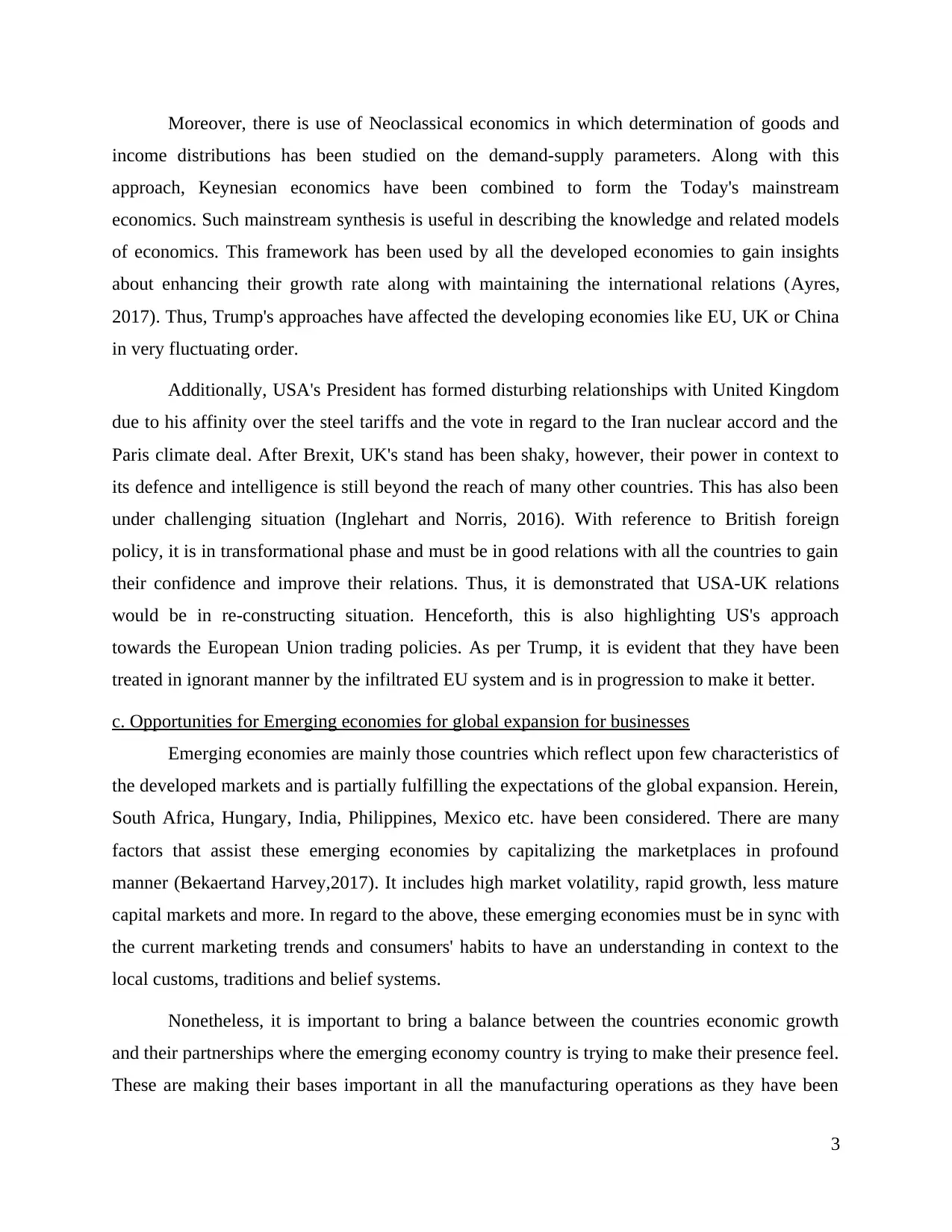
Moreover, there is use of Neoclassical economics in which determination of goods and
income distributions has been studied on the demand-supply parameters. Along with this
approach, Keynesian economics have been combined to form the Today's mainstream
economics. Such mainstream synthesis is useful in describing the knowledge and related models
of economics. This framework has been used by all the developed economies to gain insights
about enhancing their growth rate along with maintaining the international relations (Ayres,
2017). Thus, Trump's approaches have affected the developing economies like EU, UK or China
in very fluctuating order.
Additionally, USA's President has formed disturbing relationships with United Kingdom
due to his affinity over the steel tariffs and the vote in regard to the Iran nuclear accord and the
Paris climate deal. After Brexit, UK's stand has been shaky, however, their power in context to
its defence and intelligence is still beyond the reach of many other countries. This has also been
under challenging situation (Inglehart and Norris, 2016). With reference to British foreign
policy, it is in transformational phase and must be in good relations with all the countries to gain
their confidence and improve their relations. Thus, it is demonstrated that USA-UK relations
would be in re-constructing situation. Henceforth, this is also highlighting US's approach
towards the European Union trading policies. As per Trump, it is evident that they have been
treated in ignorant manner by the infiltrated EU system and is in progression to make it better.
c. Opportunities for Emerging economies for global expansion for businesses
Emerging economies are mainly those countries which reflect upon few characteristics of
the developed markets and is partially fulfilling the expectations of the global expansion. Herein,
South Africa, Hungary, India, Philippines, Mexico etc. have been considered. There are many
factors that assist these emerging economies by capitalizing the marketplaces in profound
manner (Bekaertand Harvey,2017). It includes high market volatility, rapid growth, less mature
capital markets and more. In regard to the above, these emerging economies must be in sync with
the current marketing trends and consumers' habits to have an understanding in context to the
local customs, traditions and belief systems.
Nonetheless, it is important to bring a balance between the countries economic growth
and their partnerships where the emerging economy country is trying to make their presence feel.
These are making their bases important in all the manufacturing operations as they have been
3
income distributions has been studied on the demand-supply parameters. Along with this
approach, Keynesian economics have been combined to form the Today's mainstream
economics. Such mainstream synthesis is useful in describing the knowledge and related models
of economics. This framework has been used by all the developed economies to gain insights
about enhancing their growth rate along with maintaining the international relations (Ayres,
2017). Thus, Trump's approaches have affected the developing economies like EU, UK or China
in very fluctuating order.
Additionally, USA's President has formed disturbing relationships with United Kingdom
due to his affinity over the steel tariffs and the vote in regard to the Iran nuclear accord and the
Paris climate deal. After Brexit, UK's stand has been shaky, however, their power in context to
its defence and intelligence is still beyond the reach of many other countries. This has also been
under challenging situation (Inglehart and Norris, 2016). With reference to British foreign
policy, it is in transformational phase and must be in good relations with all the countries to gain
their confidence and improve their relations. Thus, it is demonstrated that USA-UK relations
would be in re-constructing situation. Henceforth, this is also highlighting US's approach
towards the European Union trading policies. As per Trump, it is evident that they have been
treated in ignorant manner by the infiltrated EU system and is in progression to make it better.
c. Opportunities for Emerging economies for global expansion for businesses
Emerging economies are mainly those countries which reflect upon few characteristics of
the developed markets and is partially fulfilling the expectations of the global expansion. Herein,
South Africa, Hungary, India, Philippines, Mexico etc. have been considered. There are many
factors that assist these emerging economies by capitalizing the marketplaces in profound
manner (Bekaertand Harvey,2017). It includes high market volatility, rapid growth, less mature
capital markets and more. In regard to the above, these emerging economies must be in sync with
the current marketing trends and consumers' habits to have an understanding in context to the
local customs, traditions and belief systems.
Nonetheless, it is important to bring a balance between the countries economic growth
and their partnerships where the emerging economy country is trying to make their presence feel.
These are making their bases important in all the manufacturing operations as they have been
3
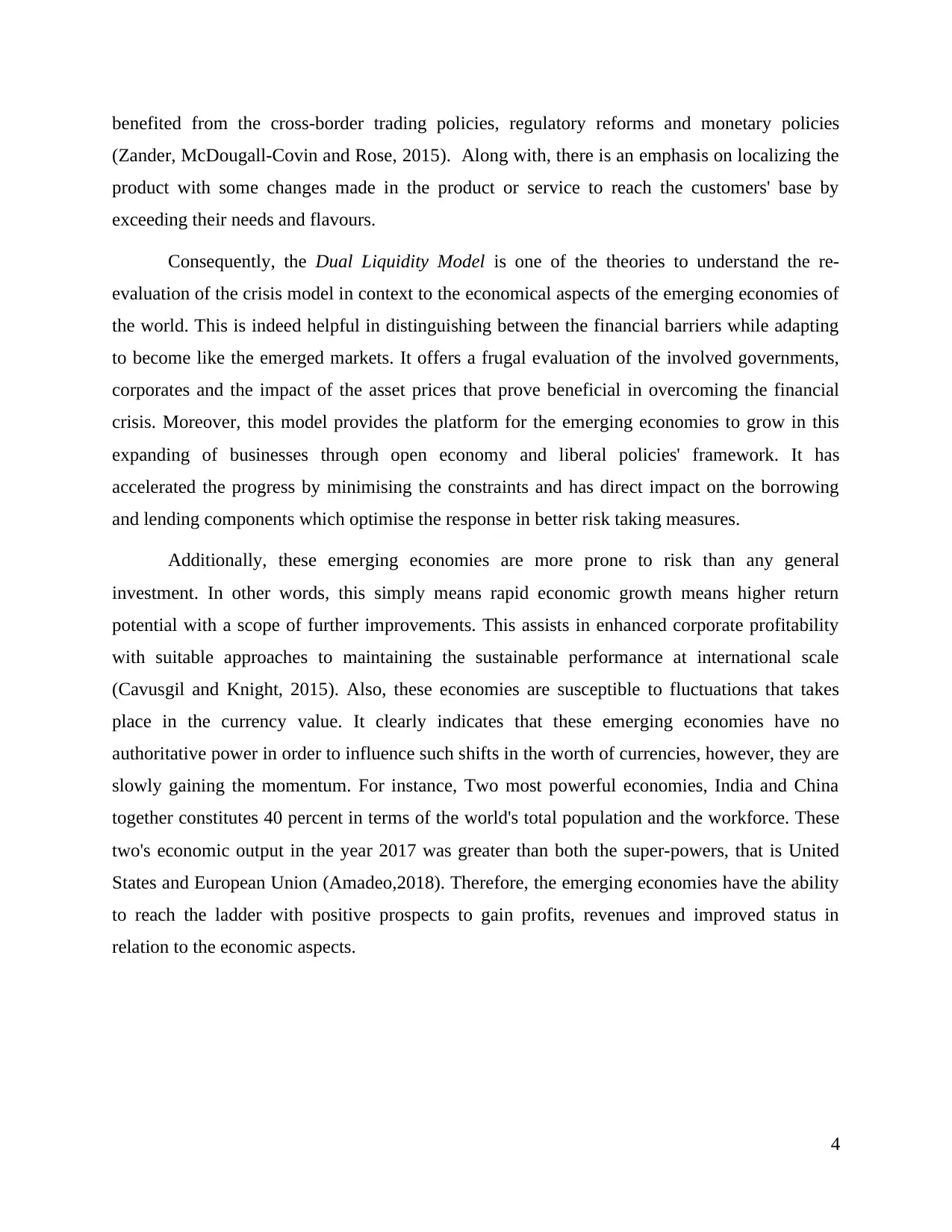
benefited from the cross-border trading policies, regulatory reforms and monetary policies
(Zander, McDougall-Covin and Rose, 2015). Along with, there is an emphasis on localizing the
product with some changes made in the product or service to reach the customers' base by
exceeding their needs and flavours.
Consequently, the Dual Liquidity Model is one of the theories to understand the re-
evaluation of the crisis model in context to the economical aspects of the emerging economies of
the world. This is indeed helpful in distinguishing between the financial barriers while adapting
to become like the emerged markets. It offers a frugal evaluation of the involved governments,
corporates and the impact of the asset prices that prove beneficial in overcoming the financial
crisis. Moreover, this model provides the platform for the emerging economies to grow in this
expanding of businesses through open economy and liberal policies' framework. It has
accelerated the progress by minimising the constraints and has direct impact on the borrowing
and lending components which optimise the response in better risk taking measures.
Additionally, these emerging economies are more prone to risk than any general
investment. In other words, this simply means rapid economic growth means higher return
potential with a scope of further improvements. This assists in enhanced corporate profitability
with suitable approaches to maintaining the sustainable performance at international scale
(Cavusgil and Knight, 2015). Also, these economies are susceptible to fluctuations that takes
place in the currency value. It clearly indicates that these emerging economies have no
authoritative power in order to influence such shifts in the worth of currencies, however, they are
slowly gaining the momentum. For instance, Two most powerful economies, India and China
together constitutes 40 percent in terms of the world's total population and the workforce. These
two's economic output in the year 2017 was greater than both the super-powers, that is United
States and European Union (Amadeo,2018). Therefore, the emerging economies have the ability
to reach the ladder with positive prospects to gain profits, revenues and improved status in
relation to the economic aspects.
4
(Zander, McDougall-Covin and Rose, 2015). Along with, there is an emphasis on localizing the
product with some changes made in the product or service to reach the customers' base by
exceeding their needs and flavours.
Consequently, the Dual Liquidity Model is one of the theories to understand the re-
evaluation of the crisis model in context to the economical aspects of the emerging economies of
the world. This is indeed helpful in distinguishing between the financial barriers while adapting
to become like the emerged markets. It offers a frugal evaluation of the involved governments,
corporates and the impact of the asset prices that prove beneficial in overcoming the financial
crisis. Moreover, this model provides the platform for the emerging economies to grow in this
expanding of businesses through open economy and liberal policies' framework. It has
accelerated the progress by minimising the constraints and has direct impact on the borrowing
and lending components which optimise the response in better risk taking measures.
Additionally, these emerging economies are more prone to risk than any general
investment. In other words, this simply means rapid economic growth means higher return
potential with a scope of further improvements. This assists in enhanced corporate profitability
with suitable approaches to maintaining the sustainable performance at international scale
(Cavusgil and Knight, 2015). Also, these economies are susceptible to fluctuations that takes
place in the currency value. It clearly indicates that these emerging economies have no
authoritative power in order to influence such shifts in the worth of currencies, however, they are
slowly gaining the momentum. For instance, Two most powerful economies, India and China
together constitutes 40 percent in terms of the world's total population and the workforce. These
two's economic output in the year 2017 was greater than both the super-powers, that is United
States and European Union (Amadeo,2018). Therefore, the emerging economies have the ability
to reach the ladder with positive prospects to gain profits, revenues and improved status in
relation to the economic aspects.
4
⊘ This is a preview!⊘
Do you want full access?
Subscribe today to unlock all pages.

Trusted by 1+ million students worldwide
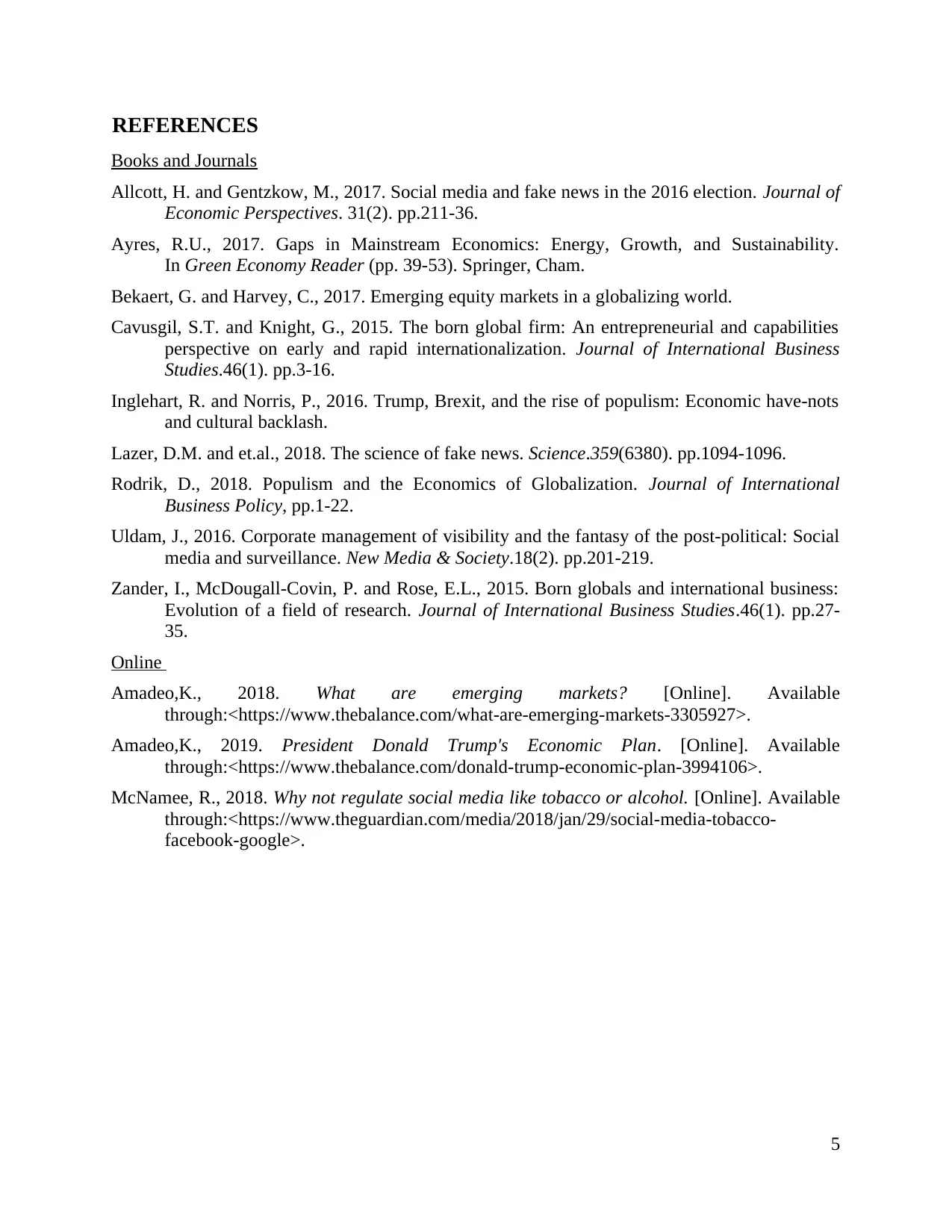
REFERENCES
Books and Journals
Allcott, H. and Gentzkow, M., 2017. Social media and fake news in the 2016 election. Journal of
Economic Perspectives. 31(2). pp.211-36.
Ayres, R.U., 2017. Gaps in Mainstream Economics: Energy, Growth, and Sustainability.
In Green Economy Reader (pp. 39-53). Springer, Cham.
Bekaert, G. and Harvey, C., 2017. Emerging equity markets in a globalizing world.
Cavusgil, S.T. and Knight, G., 2015. The born global firm: An entrepreneurial and capabilities
perspective on early and rapid internationalization. Journal of International Business
Studies.46(1). pp.3-16.
Inglehart, R. and Norris, P., 2016. Trump, Brexit, and the rise of populism: Economic have-nots
and cultural backlash.
Lazer, D.M. and et.al., 2018. The science of fake news. Science.359(6380). pp.1094-1096.
Rodrik, D., 2018. Populism and the Economics of Globalization. Journal of International
Business Policy, pp.1-22.
Uldam, J., 2016. Corporate management of visibility and the fantasy of the post-political: Social
media and surveillance. New Media & Society.18(2). pp.201-219.
Zander, I., McDougall-Covin, P. and Rose, E.L., 2015. Born globals and international business:
Evolution of a field of research. Journal of International Business Studies.46(1). pp.27-
35.
Online
Amadeo,K., 2018. What are emerging markets? [Online]. Available
through:<https://www.thebalance.com/what-are-emerging-markets-3305927>.
Amadeo,K., 2019. President Donald Trump's Economic Plan. [Online]. Available
through:<https://www.thebalance.com/donald-trump-economic-plan-3994106>.
McNamee, R., 2018. Why not regulate social media like tobacco or alcohol. [Online]. Available
through:<https://www.theguardian.com/media/2018/jan/29/social-media-tobacco-
facebook-google>.
5
Books and Journals
Allcott, H. and Gentzkow, M., 2017. Social media and fake news in the 2016 election. Journal of
Economic Perspectives. 31(2). pp.211-36.
Ayres, R.U., 2017. Gaps in Mainstream Economics: Energy, Growth, and Sustainability.
In Green Economy Reader (pp. 39-53). Springer, Cham.
Bekaert, G. and Harvey, C., 2017. Emerging equity markets in a globalizing world.
Cavusgil, S.T. and Knight, G., 2015. The born global firm: An entrepreneurial and capabilities
perspective on early and rapid internationalization. Journal of International Business
Studies.46(1). pp.3-16.
Inglehart, R. and Norris, P., 2016. Trump, Brexit, and the rise of populism: Economic have-nots
and cultural backlash.
Lazer, D.M. and et.al., 2018. The science of fake news. Science.359(6380). pp.1094-1096.
Rodrik, D., 2018. Populism and the Economics of Globalization. Journal of International
Business Policy, pp.1-22.
Uldam, J., 2016. Corporate management of visibility and the fantasy of the post-political: Social
media and surveillance. New Media & Society.18(2). pp.201-219.
Zander, I., McDougall-Covin, P. and Rose, E.L., 2015. Born globals and international business:
Evolution of a field of research. Journal of International Business Studies.46(1). pp.27-
35.
Online
Amadeo,K., 2018. What are emerging markets? [Online]. Available
through:<https://www.thebalance.com/what-are-emerging-markets-3305927>.
Amadeo,K., 2019. President Donald Trump's Economic Plan. [Online]. Available
through:<https://www.thebalance.com/donald-trump-economic-plan-3994106>.
McNamee, R., 2018. Why not regulate social media like tobacco or alcohol. [Online]. Available
through:<https://www.theguardian.com/media/2018/jan/29/social-media-tobacco-
facebook-google>.
5
1 out of 7
Related Documents
Your All-in-One AI-Powered Toolkit for Academic Success.
+13062052269
info@desklib.com
Available 24*7 on WhatsApp / Email
![[object Object]](/_next/static/media/star-bottom.7253800d.svg)
Unlock your academic potential
Copyright © 2020–2025 A2Z Services. All Rights Reserved. Developed and managed by ZUCOL.





